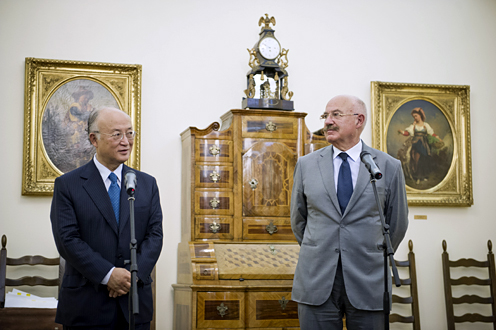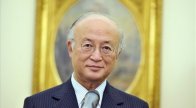On 21 June 2012 Yukiya Amano, Director General of the IAEA arrived to Budapest for an official visit. In the morning Mr. Amano visited the Hungarian Academy of Sciences Center for Energy Research then he met with Mr. György Matolcsy Minister of National Economy.
The Minister of Foreign Affairs Mr. János Martonyi received him at a working luncheon that was followed by a joint press conference at the Foreign Ministry. In the afternoon the Director General had talks in the Parliament with State Secretary and Chief of Cabinet to the Prime Minister Mr. János Lázár. Finally he met Mrs. Lászlóné Németh, Minister of National Development. In the evening the delegation arrived to Paks where they visited the power plant on Friday.
At the joint press conference with Mr. Amano, Mr. Martonyi commanded the IAEA for its efforts to seek solutions for open questions of the Iranian nuclear issue. He underlined that Hungary shares the serious concerns of the international community and agrees with the EU’s common position on that as it is put forward in the relevant statements by High Representative Catherine Ashton. Finally, Mr. Martonyi highlighted the special Hungarian expertise in the nuclear field that Hungary can offer for the Agency.

Mr. Amano, said that the purpose of his visit was to meet Hungarian decision-makers and to visit important sites of Hungary’s nuclear energy program. On Friday he also visited the Paks Nuclear Power Plant.Mr. Amano stressed that the IAEA’s relation with Hungary has traditionally been excellent, and his intention is to widen and deepen this cooperation.
In response to a question, Director General Amano said that although negotiations with Iran have not yet been successful in finding a reassuring explanation for the suspected military dimensions of Iran’s nuclear program, there is a firm political will to carry on the dialogue. He pointed out that the activity at the Iranian military site of Parchin is not the only one contested, but the Agency identified 12 more areas which all need further clarification.
(Source: Ministry of Foreign Affairs)



